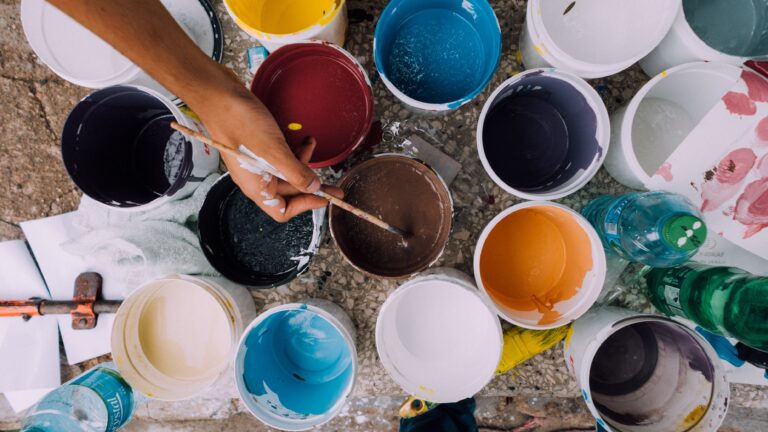If you have great techniques to provide good services and want to start a business. Then it would be best if you worked with a person or in a company for some months or years to know how to start a good business. For some people, painting is a dream. If you love to work with your own hands and genuinely enjoy doing work, then you should start your own painting business.
STEPS FOR STARTING A BUSINESS

Step 1. Learn the basics of painting:
If you want to start your own business, you should know everything about it. If you have no information, you will make many mistakes, which will cause a loss of your money. You should attain basic details to satisfy your customers and should get complete knowledge about it. You will learn everything when you work with a person or company for a few months or years.
Step 2. Register your business name:
The next step to starting a business is giving your painting business a professional name. The name of your business should be easy and memorable so that everyone can remember it easily.
People always look at these things in business:
- A well-known website
- Business Address – Commercial or Residential.
You can do well with your business by uploading legal documents.
Step 3. Select the best painting services:
For starting your own painting business, you should be familiar with residential and commercial marketing.
It will make your business popular and worthful in the market.
Step 4 . Make license and insurance:
If the list of offers you’ll serve by your business is ready. Then you need a business license. By having this license, you can work legally.
These things are essential for a business license
- Have business cards.
- LLC paperwork file.
- Employer Identification Number (EIN) file.
- Opening of a bank account.
- Requirements of builder’s license.
- Commercial General Liability insurance.
Step 5. Buy necessary materials for painting:
For the set up of your new business, you should buy the materials which are used in painting. If you work as a subcontractor, you do not need anything to buy. You only need materials that will provide benefits to your business.
For the painting business, you need these tools
- Paint sprayer.
- Brushes.
- Ladder
- Sandpaper.
- Dropcloth.
Step 6. Open Bank Account For Business:
You have to open a bank account to manage your financial situation. Set up a business account for personal and office work.
To open an account, you need
- Business documents.
- Agreements of ownership.
- Employer Identification Number.
- Business license.
Step 7. Search for painters:
Painters are essential for the success of a business.
For hiring employees, you do
- Write a post for Job.
- Title of job.
- Details of Job.
- Skills and experience.
Step 8. Marketing for your painting business:
There are many ways of marketing through which you grow up your business performance and customer service.
Some of these are mentioned here;
- Online marketing.
- Advertisement through print.
- Through social media.
- Write mail on the website of a company.
Plan Your Business
Even though you might not think that creating a business plan is needed before launching a reputable company, there are several benefits to doing your analysis. Furthermore, as long as it includes a few fundamental topics, your business plan can be as short or lengthy as you like. Putting words on paper (or, as it were, letters on a screen) shouldn’t intimidate you: The most effective business plans are iterative because they adapt to your company’s demands as it develops and changes over time.
A strong business plan gives you a road map for starting your firm and a set of rules to live by after it is established. Successful business owners are typically pressed for time, which means you may lack the mental capacity to work on excellent strategy development activities while juggling employment, keeping the books straight, and collecting bills. A solid business plan keeps you on the course when remaining afloat becomes a full-time job.
Starting a painting business with no experience
If you want to start a painting business but have no experience with painting, you can join painting clubs or painting schools to start your career and get great ideas.
The painting is relatively simple but not easy. Painting is like a project on which many people work. The master painters are still here, but for painting, there is no need for a remarkable degree. It depends on your skills. You can do exterior and interior painting for your excellent work.
Read More: The Benefits of Online Loans
If you haven’t any experience, you should learn the basics of painting.
- Firstly, you should know about painting. The way to become a good painter is to practice.
- Then search if there is any demand for painting in your area or city.
- If you are serious and really want to start a business, you have to give more time to your work in the starting months for the establishment of your business. If you have no idea about how and where you start a business, then visit the business website. Check their resources and visit there to get information that is needed.
- If you have a solid idea about the expenses of painting and then you should focus on your expenses.
How to Start a Small Painting Business?
If you are a painter and have been doing this work for many years, you can start your own business. The start of a small painting business has many advantages, and it can give you profit.
- Painting is simple, and if you are interested, you will learn quickly.
- For the start-up of a painting business, the minimum cost is required.
- One of the goals of small businesses should be that the owners will make a profit.
- You have many options for your service;
- Residential interior.
- Exterior painting.
- Construction painting.
Equipment needed to start a painting business:
For commercial paintings, you need these things;
- Pressure washer.
- Drop clothes.
- Ladders.
- Scrapers.
- Sandpaper.
- Brushes.
- Rollers.
- Primers.
For residential painting, you need the following;
- Brushes.
- Paints.
- Watercolors.
- Papers.
- Wooden board.
FAQs
Paints have a 20 percent margin, while thinners and varnish give a 15 percent margin.
In case of an accident during the job, business insurance helps your employees and business with finance.
It’s best to learn and get into the painting industry and learn about the basics before starting your own business.
